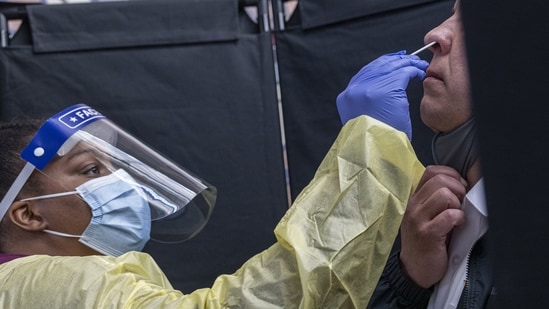December 3: What we know about Omicron variant so far
It is still not known whether the virus in the new configuration with over 50 mutations from its ancestor first spotted in Wuhan is leading to more serious disease, or if it is infecting vaccinated people more often than other variants of concern.
South Africa recorded 11,535 new cases of Covid-19 on Thursday, a sharp jump from the 2,465 infections added a week prior. While some of it could be attributed to surge testing, but increasingly, the sharper trajectory of this wave, likely triggered by the Omicron variant, is becoming conclusive.

It is still not known whether the virus in the new configuration with over 50 mutations from its ancestor first spotted in Wuhan is leading to more serious disease, or if it is infecting vaccinated people more often than other variants of concern.
But two reports, one by South African researchers published late on Thursday and another by the UK Health Security Agency (UKHSA) on Friday, said with some degree of confidence that people who were infected in the past may be at a greater risk of a repeat infection with Omicron.
In the first report, a team led by researchers from South Africa’s National Health Laboratory Service analysed infection trends to conclude they believe the risk of reinfection is roughly 2.5 times higher.
The latest report is an update to the team’s running study on reinfections, which has covered nearly 2.8 million cases in South Africa so far. “Population-level evidence suggests that the Omicron variant is associated with substantial ability to evade immunity from prior infection. In contrast, there is no population-wide epidemiological evidence of immune escape associated with the Beta or Delta variants,” the report said, adding that a case is regarded as a reinfection if the preceding positive test was more than 90 days prior.
The second report, UKHSA’s technical briefing on Sars-Cov-2 variants, detailed the findings from the 22 Omicron infections in UK till now, and a review of evidence from other studies. In its preliminary risk assessment (which carried a low confidence rating), UKHSA said it believes the variant could cheat naturally acquired immunity, vaccine acquired immunity, and therapeutics such as monoclonal antibodies.
A low confidence rating is when the experts await more data.
But among the data they did take into account was structural modelling of Omicron by the University of Oxford, which “indicates that the mutations present in Omicron are highly likely to affect the binding of natural and therapeutic antibodies, and to enhance binding to human Angiotensin-Converting Enzyme 2 (ACE2) to an extent greater than that seen in other variants to date”.
ACE2 binding is how the Sars-Cov-2 enters human cells.
In reference to Omicron’s ability to spread, the UKHSA risk assessment, also rated at low confidence, said the variant may be “at least as transmissible as currently circulating variants” and that it is biologically plausible for it to be more transmissible than Delta.
The report noted that of the 22 cases, there more young and middle-aged people, and of the total 30% were unvaccinated, 10% partially vaccinated and 60% were fully vaccinated – till date, none of the infections were hospitalised.
Experts said the numbers were too low to interpret if the variant was affecting particular ages or those with vaccination more.
A third document published on Friday, the minutes of a November 29 meeting of UK’s Scientific Advisory Group for Emergencies (SAGE) – the top group of pandemic experts in the country – said: “All known antigenic sites for neutralising antibodies are potentially disrupted, which has not been seen in combination in any previous variant... There is likely to be a greater reduction in protection conferred by previous infections or vaccines against infection than against severe disease (high confidence).”
The World Health Organization reiterated calls for countries and people to avoid panic, although a spokesperson said vaccine makers may need to gear up for the likelihood that they will need to make changes to their products.
Maria Van Kerkhove, WHO’s technical lead on Covid-19, while taking questions from people on social media, said Omicron has now been reported in 38 countries, with the variant now spread across all six WHO regions.
WHO will still take several weeks to determine how infectious Omicron is, and to assess how vaccines, tests and treatments hold up against it, Kerkhove added.
“We’re going to get the answers that everybody out there needs,” WHO emergencies director Michael Ryan, also at the session, said. “We need to trust in the science now and be patient and not be fearful,” he added.




